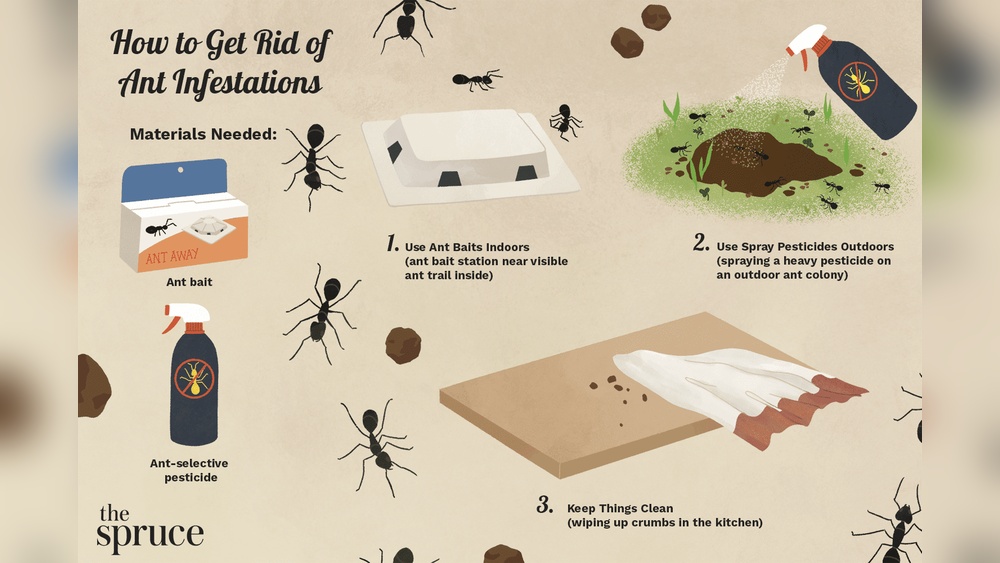Are ants marching through your kitchen, turning your clean space into their personal buffet? You’re not alone—and it’s more common than you think.
These tiny invaders are drawn to your kitchen by the food crumbs, water droplets, and cozy hiding spots you might not even notice. But don’t worry, you don’t have to live with them or reach for harsh chemicals right away.
You’ll discover simple, effective ways to stop ants in their tracks and keep your kitchen ant-free for good. Ready to reclaim your space? Let’s dive in and tackle those ants together!

Ants In The Kitchen
Ants are common in kitchens because they seek food, water, and shelter. Small crumbs or sticky spills attract them easily. They love sweets and often target pet food left out. Leaky pipes, standing water, or damp places provide the water ants need. Kitchens offer many entry points like cracks or gaps, giving ants easy access. Once a scout ant finds food, it leaves a chemical trail for others to follow, causing an infestation. Keeping food sealed and cleaning spills quickly can help reduce the attraction.
Food And Water Sources
Ants love sweets, grease, and leftover crumbs on kitchen counters. They also go for open food packages like sugar, cereal, and pet food. Even small spills of juice or syrup can attract them quickly.
Hidden water sources help ants survive. Leaky pipes under the sink create damp spots. Standing water in dishwashers or pet bowls also draws ants. Moisture from spills or condensation can be enough for them.
To stop ants, keep food sealed tightly. Clean crumbs and spills right away. Fix any leaks and wipe dry wet areas often. These steps remove the food and water ants need to thrive.
Entry Points And Nesting
Ants enter kitchens through small cracks in walls, gaps around windows, and door frames. They also use spaces where pipes or wires enter the home. These typical entryways allow easy access to food and water.
Inside, ants often build nests near warmth and moisture. Common spots include behind appliances like refrigerators and dishwashers. They also nest under sinks, inside cabinets, and within wall voids.
| Entry Points | Nesting Areas |
|---|---|
| Cracks in walls and floors | Behind kitchen appliances |
| Gaps around windows and doors | Under sinks and cabinets |
| Spaces near pipes or wires | Inside wall voids |
Cleaning And Prevention
Remove all food crumbs and spills immediately. Ants follow food smells easily. Wipe counters and sweep floors daily. Store food in airtight containers to stop ants from smelling it. Pet food should not be left out for long.
Seal all cracks and holes around windows, doors, and walls. Ants enter through even very small gaps. Use caulk or weather stripping to close these entry points. Check pipes and vents too.
Fix any water leaks under sinks or near appliances. Ants need water to survive. Keep kitchen surfaces dry and use a dehumidifier if the room is humid. Standing water invites ants quickly.
Natural Remedies
Mix equal parts of vinegar and water in a spray bottle. Spray this solution on ant trails and entry points. The strong smell disrupts their scent trails and keeps ants away. Repeat daily for best results.
Create homemade ant baits using sugar and borax. Mix 1 part borax with 3 parts sugar and add water to make a paste. Place small amounts near ant paths. Ants carry the bait back to their nest, helping to eliminate the colony.
| Essential Oil | Effect on Ants | How to Use |
|---|---|---|
| Peppermint Oil | Repels ants with a strong scent | Mix 10 drops with water and spray |
| Lemon Oil | Disrupts ant trails and deters ants | Apply on cotton balls near entry points |
| Tea Tree Oil | Kills ants and masks scent trails | Spray diluted solution around kitchen |
Commercial Treatments
Ant bait stations are effective for controlling ants in kitchens. They attract ants with a tasty poison. Worker ants carry the poison back to the colony. This method targets the entire nest, not just visible ants. Bait stations are safe to use around children and pets when placed properly.
Sprays and powders kill ants on contact. Sprays can reach ants hiding in cracks. Powders are good for spreading in hard-to-reach places. Both should be used carefully to avoid contamination of food and surfaces. Always follow label instructions for safe use.
Calling professionals is best for large infestations. Experts use stronger treatments and know ant habits. They can find and treat nests hidden inside walls or floors. Professionals provide long-lasting solutions and prevent ants from returning quickly.
Long-term Control
Keep the kitchen clean by wiping counters and floors daily. Remove crumbs and spills quickly to stop ants from finding food. Store all food in airtight containers. Take out the trash regularly to avoid attracting ants.
Check for leaks under the sink and fix them fast. Ants need water, so dry wet areas well. Use a flashlight to look for ant trails or nests near windows, doors, and walls.
Early detection helps stop ant problems before they grow. Set sticky traps to catch ants and see where they enter. Seal any cracks or holes in walls, doors, and windows. This blocks ants from coming inside again.

:max_bytes(150000):strip_icc()/SPR-how-to-get-rid-of-ants-in-your-kitchen-7558011-430413987c7f4b868c822314335f0d45.jpg)
Frequently Asked Questions
What Is The Best Homemade Ant Killer For The Kitchen?
The best homemade ant killer mixes equal parts borax and sugar. Sprinkle near ant trails; sugar attracts ants, borax kills them.
Why Are There So Many Ants In My Kitchen?
Ants invade kitchens searching for food, water, and shelter. Crumbs, spills, leaks, and cracks attract them and allow entry.
How Do You Get Rid Of Ants Permanently?
Clean all food crumbs and spills immediately. Seal food in airtight containers. Fix leaks and reduce moisture. Wipe ant trails with vinegar water. Seal entry points like cracks. Use ant bait stations to kill the colony and prevent return. Repeat as needed for lasting results.
What Smell Do Ants Hate?
Ants hate the smell of vinegar, peppermint, lemon, cinnamon, and coffee grounds. These scents repel and disrupt their trails.
Conclusion
Keeping ants out of your kitchen requires regular cleaning and vigilance. Remove food crumbs and fix leaks promptly. Wipe surfaces to erase their trails and seal entry cracks tightly. Consistency matters in preventing ants from returning. Use safe methods to protect your home and family.
Small steps lead to a kitchen free from ants and stress. Stay patient and maintain good habits for lasting results.

Yes, working as , Food Blogger and Product Reviewer for last 6 years. Here you will get amazing deals for Smart kitchen products. I am your best source for the latest update in cooking trends. I provide insightful articles, reviews, and analysis on cutting-edge kitchen gadget. My mission is to empower readers with the knowledge they need to stay ahead in a rapidly evolving coking world. Join me as we explore the future of food technology and how it shapes our lives today and tomorrow.





